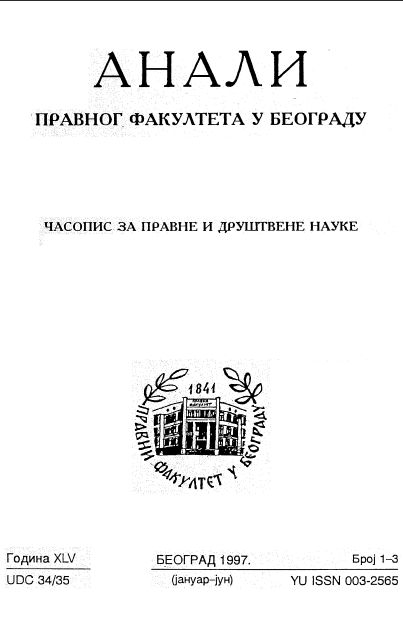МЕЂУНАРОДНИ СУД И ОВЛАШЋЕЊА САВЕТА БЕЗБЕДНОСТИ: ОД САВЕТОДАВНОГ МИШЉЕЊА О НАМИБИЈИ ДО СЛУЧАЈА LOCKERBIE
THE INTERNATIONAL COURT AND THE AUTHORITY OF THE SECURITY CONCIL: FROM AN ADVISORY OPINION ON NAMIBIA TO THE LOCKERBIE CASE
Author(s): Obrad RačićSubject(s): International Law
Published by: Правни факултет Универзитета у Београду
Keywords: International Court; International Criminal Court; Security Council of the United Nations; Collective Security; Sanctions
Summary/Abstract: In his advisory opinion Legal Consequences for States of the Continued Presence of South Africa in Namibia (South West Africa) notwithstanding Security Council Resolution 276(1970), the International Court of Justice held that the Security Council, according to Articles 24 and 25 (Chapter V of the Charter), had had the necessary authority to take legally binding decisions on matters falling outside Chapter VII of the UN Charter. By doing so, The ICJ took the view that the SC had the authority to take quasi-judicial decisions (in this case to determine the international legal status of a particular territory). A number of decisions that have been taken by the SC in recent years could be classified as ’quasi-legislative’ or ’quasi-judicial’. However, in these contemporary decisions, the SC has expressly invoked Chapter VII of the UN Charter. Interpreting the UN Charter in a very broad manner, the Security Council has taken some decisions in which certain norms and principles of international law have been developed and/or created; a number of ’measures’ falling outside those enumerated in Art. 41 and 42 of the UN Charter have been ordered; some of the existing legal rules (as interpreted by this organ) have been applied in the settlement of particular disputes which have not been directly connected with the actions aimed at restoring international peace and security; and a number of decisions that have not been implemented without necessary changes in the national laws of the Member States could be made. In contrast to situations when the decisions of the SC have not been challenged on legal grounds, the ICJ is today in a position to answer the question put by Sir G. Fitzmaurice, then the judge of the ICJ, during deliberations on Namibia: “What actual limits does the Secretary-General place on the powers of the General Assembly and the Security Council of the UN, respectively?” In the case Questions of Interpretation and Application of the 1971 Montreal Convention arising from the Aerial Incident at Lockerbie the ICJ might find it necessary to rule on the actual limits on the powers of the SC. In this situation, the SC took the position that the fact that the Libyan government had refused to surrender the accused individuals to any jurisdiction outside Libya represented a threat to international peace and security, and decided to call upon the Members of the United Nations to apply a number of ’measures’ envisaged in Art. 41 of the Charter. Keeping in mind the provisions of the 1971 Montreal Convention regarding settlement of disputes regarding its interpretation and application, it could be argued that the SC intervened in legal rights and obligations of the states parties to this multilateral instrument of a legislative character in a doubtful way. The crux of the problem seems to be in the following: (a) Some time after the aerial incident at Lockerbie had taken place, the SC decided to apply coercive measures envisaged in Chapter VII of the Charter. These measures, according to the applicant, violated some of the legal rights it enjoined under the terms of the Montreal Convention. The SC decisions under the Chapter VII Charter, of course, are binding for all UN Members. (b) The ICJ was called upon to decide whether or not the relevant provisions of the 1971 Montreal Convention have been violated. At the same time, the ICJ might find it necessary to interpret a number of provisions of the UN Charter itself. (c) Bearing in mind that the ICJ judgments are also legally binding, a number of very interesting questions come forth, including the problem of the relationship between judicial and political settlements of disputes (Chapter VI of the Charter), as well as the role of the ICJ in disputes or situations which the SC has already decided are a threat to international peace and security (Chapter VII of the Charter).
Journal: Анали Правног факултета у Београду
- Issue Year: 45/1997
- Issue No: 1-3
- Page Range: 39-68
- Page Count: 30
- Language: Serbian

